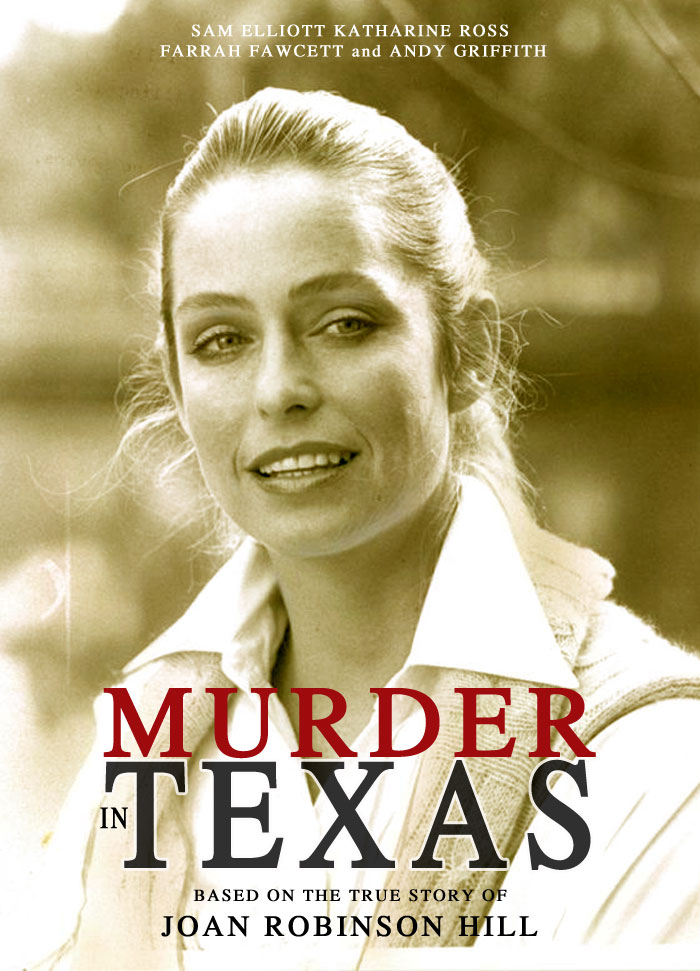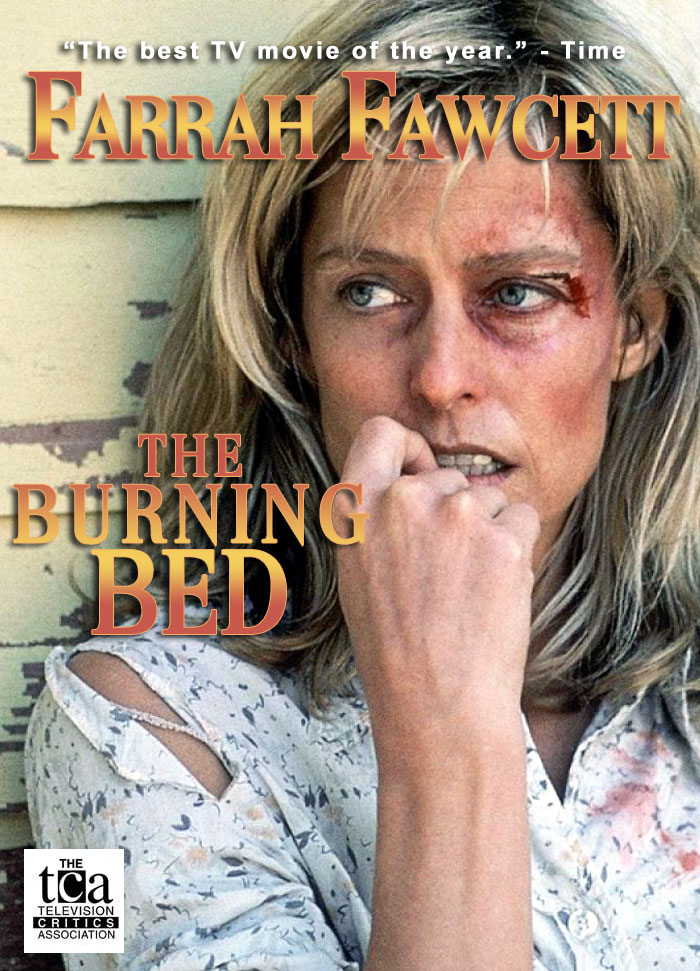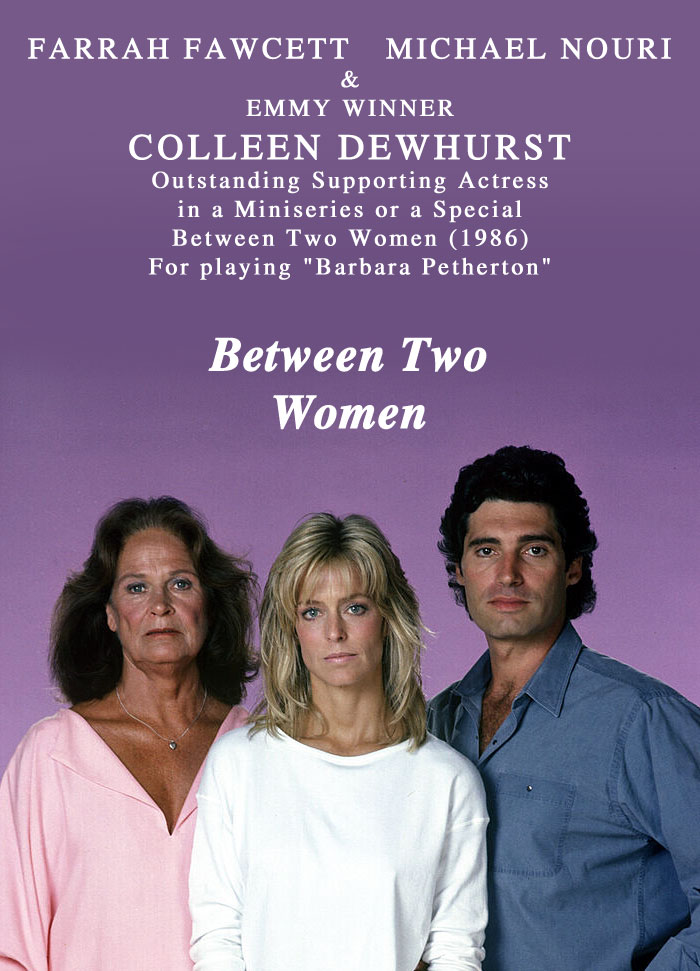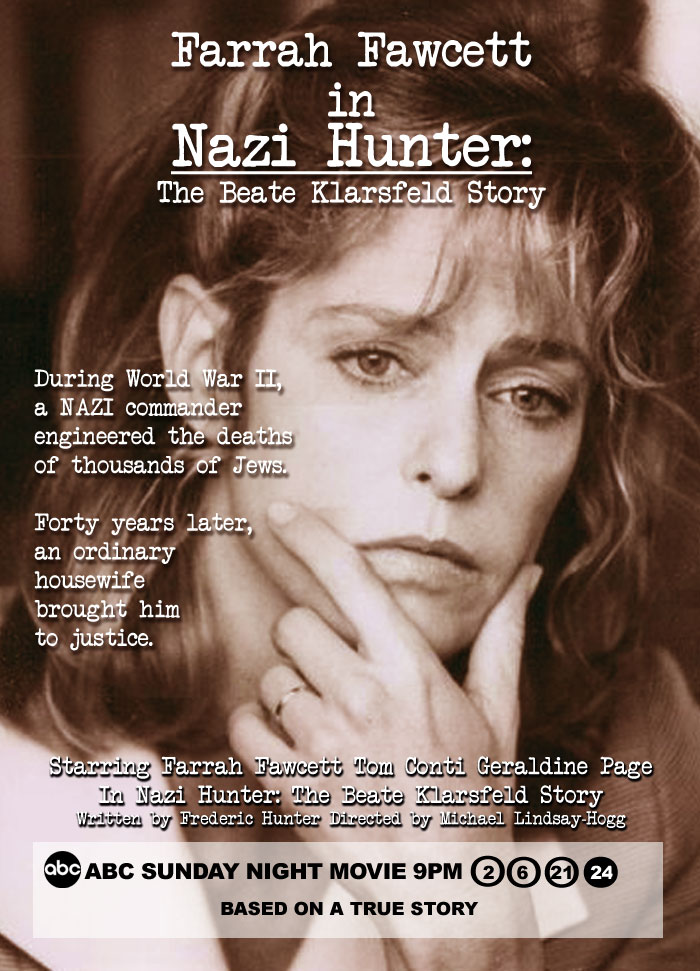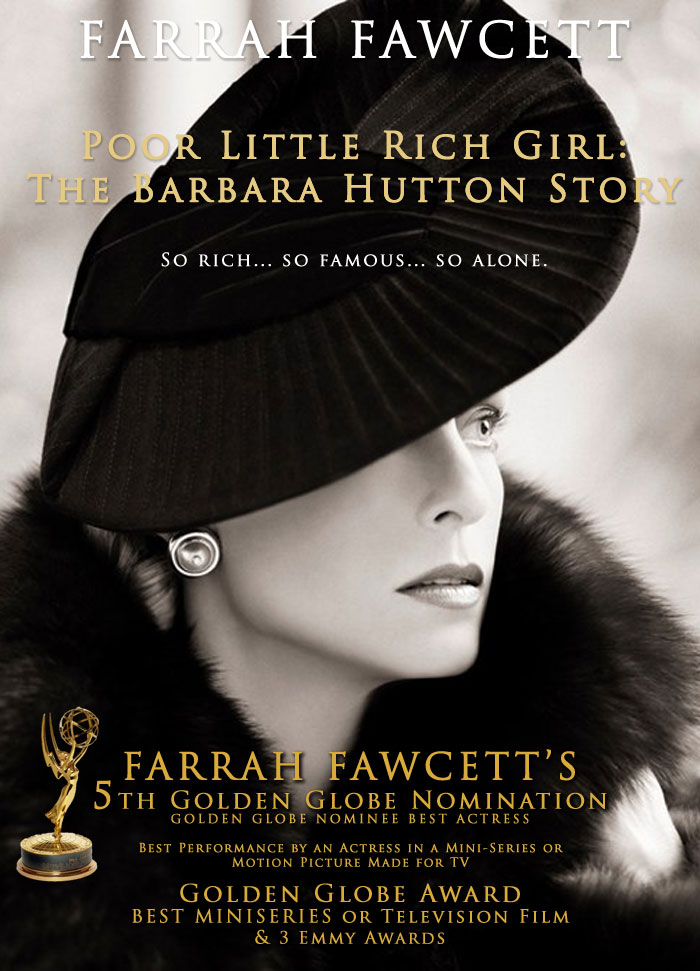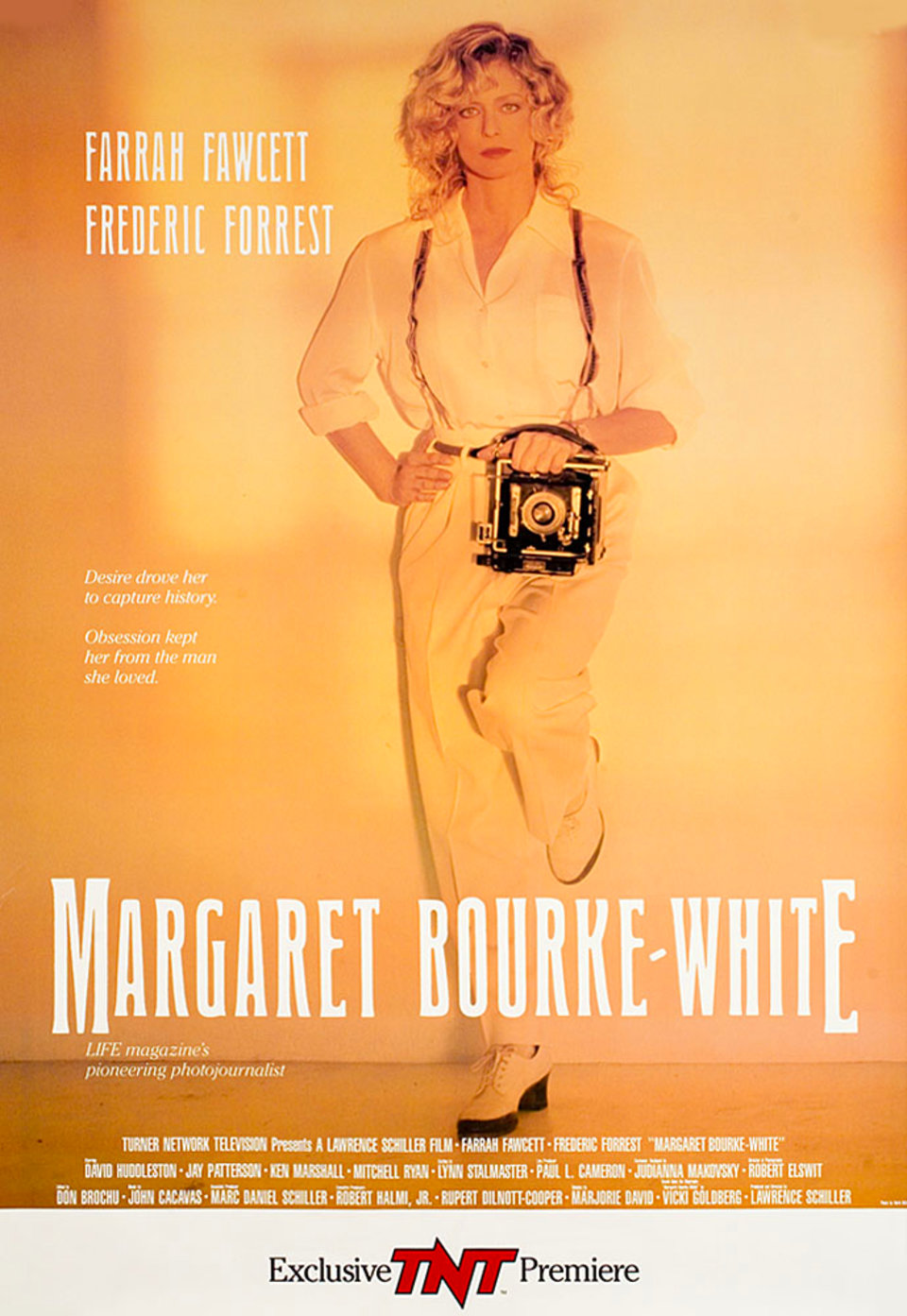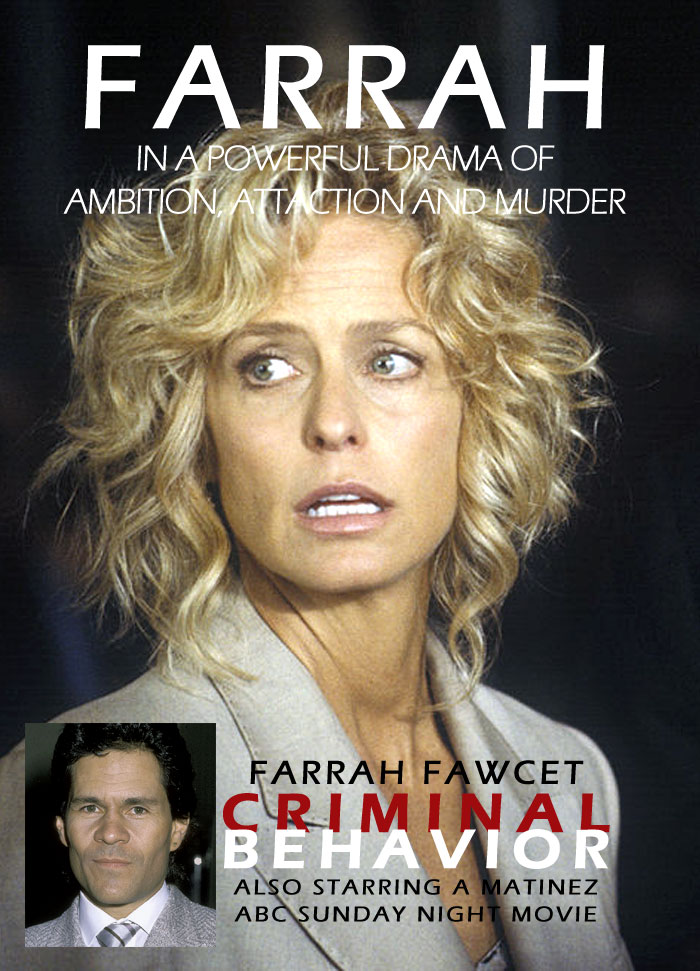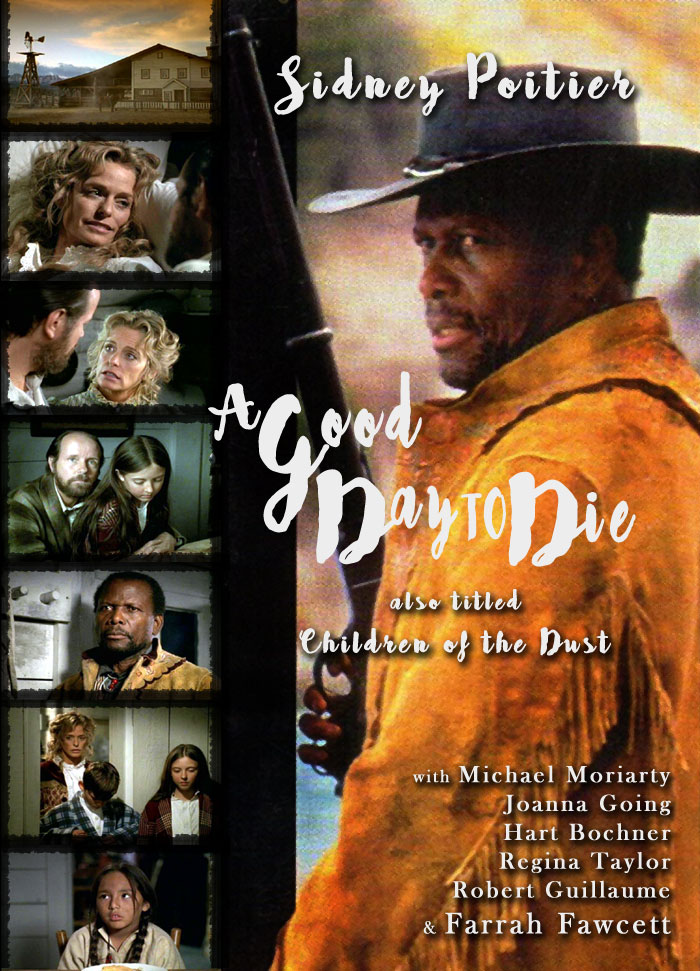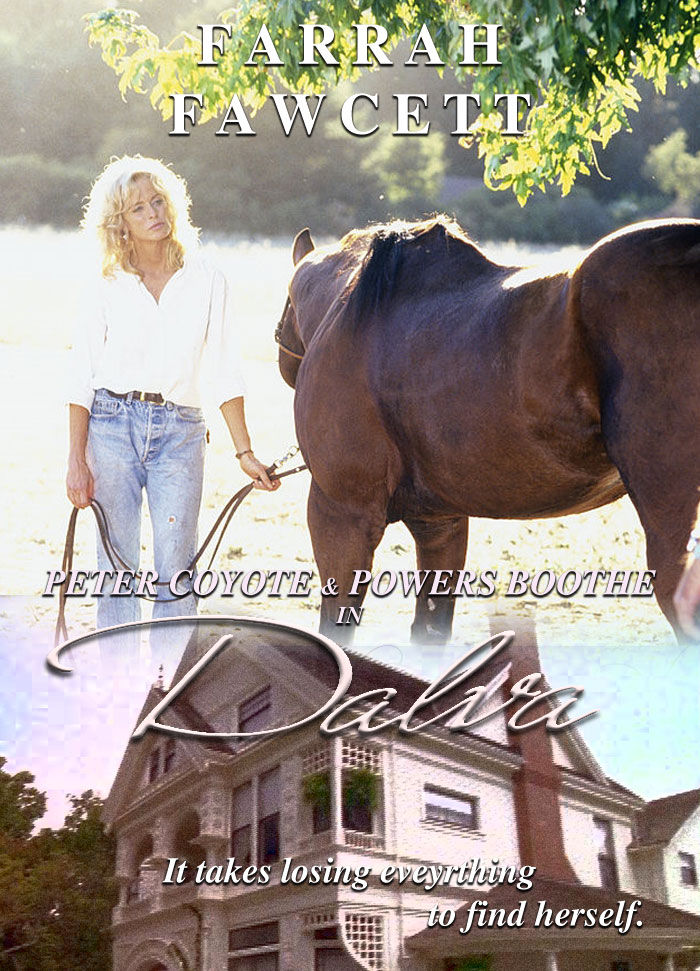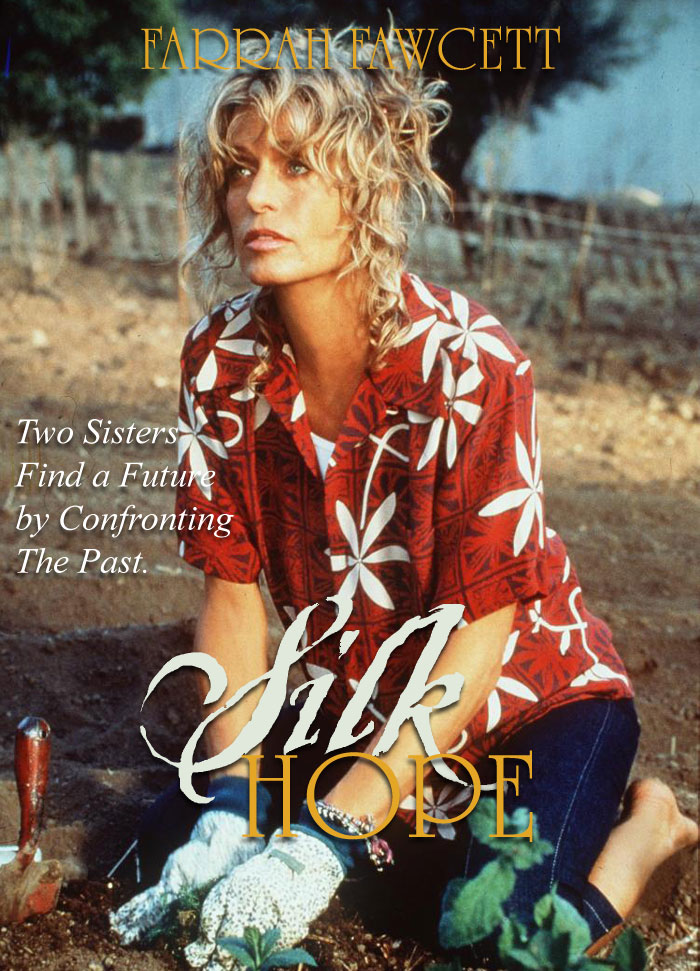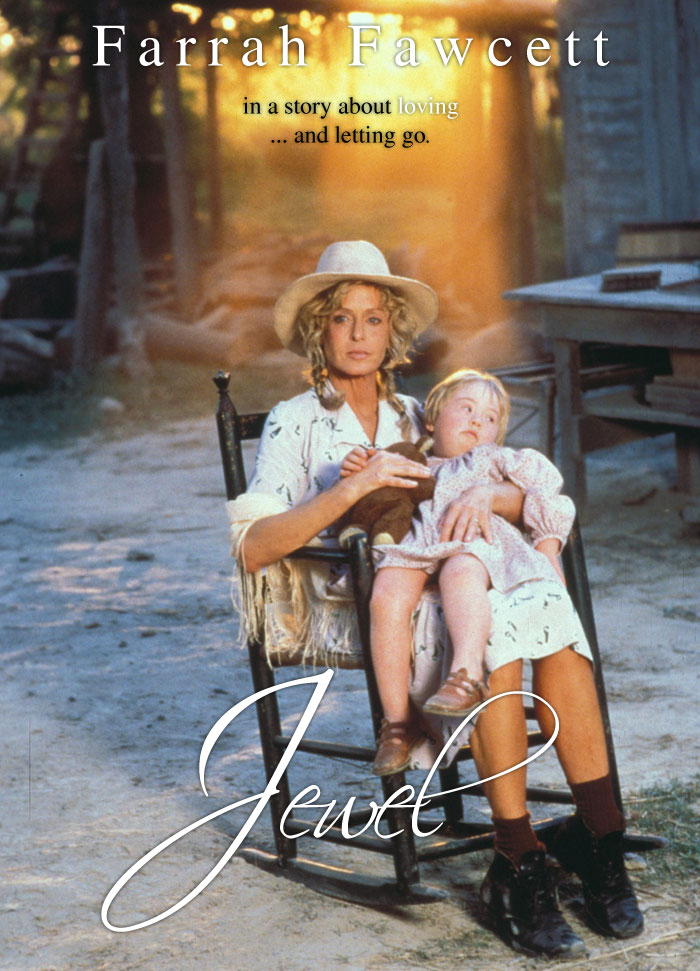After Angels Fawcett branched out into film and then found success and praise through television movies of the week. When Fawcett was a rising star the main three channels were ABC, NBC and CBS. Cable was just starting out and the choices of today via satellite and hundreds of channels didn't exist. Many of these films were presented as a special Movie of the Week and Fawcett, like Lindsay Wagner, Jaclyn Smith and other actors found a lot of work on television in these films.
John Hill (Sam Elliott) is a plastic surgeon who may not be what he seems. His first wife, Joan Robinson (Farrah Fawcett), is a socialite who falls ill and dies under suspicious circumstances. Hill proceeds to marry his mistress, divorcée Ann Kurth (Katharine Ross), with whom he conducted an affair while still married to Joan. Ash Robinson (Andy Griffith), Joan's father, is convinced that Hill murdered his daughter. And he is intent on bringing the doctor to justice.
The Burning Bed
A non-fiction book by Faith McNulty about a battered Dansville, Michigan housewife, Francine Hughes. After thirteen years of domestic abuse, she set her husband aflame while he slept on March 9, 1977.
The location of the house that was burned down is still visible in Dansville to this day. Hughes told her children to put on their coats and wait in the car. She then started a fire with gasoline poured around her sleeping husband's bed. The house burst into flames as she and the children drove to the local police station to confess.
After going to trial in Lansing, Hughes was found not guilty by reason of insanity by a jury of her peers. The book by Faith McMulty was made into a TV movie starring Farrah Fawcett, which aired on the NBC network in 1984. Lyn Hardy, a folk singer, wrote a song, entitled The Ballad of Francine Hughes about the same event. It subsequently went platinum.
Fawcett achieved critical praise and her first of three Emmy Award nominations as a serious actress for her role as a battered wife in the 1984 television movie The Burning Bed.
The Burning Bed was a critical success for Fawcett. The television movie was the first to have a 1.800 number for victims of abuse hotline as the movie concluded. It was also one of the highest watched television movies.
AWARDS
The Burning Bed Nominations
Primetime Emmy Award for Outstanding Lead Actress in a Limited Series or a Movie
1985 · Farrah Fawcett
Golden Globe Award for Best Performance by an Actress In A Mini-series or Motion Picture Made for Television
1985 · Farrah Fawcett
Golden Globe Award for Best Miniseries or Television Film
1985
Primetime Emmy Award for Outstanding Supporting Actor in a Limited Series or a Movie
1985 · Richard Masur
TCA Award for Outstanding Achievement in Drama
1985 · Farrah Fawcett
Primetime Emmy Award for Outstanding Writing for a Limited Series, Movie, or Dramatic Special
1985 · Rose Goldemberg
Primetime Emmy Award for Outstanding Directing for a Limited Series, Movie or Dramatic Special
1985 · Robert Greenwald
DGA Award for Outstanding Directorial Achievement in Television Film/Miniseries
1984 · Robert Greenwald
TCA Award for Program of the Year
1985
Primetime Emmy Award for Outstanding Achievement in Makeup
1985 · Fred C. Blau Jr., Michael Hancock
Primetime Emmy Award for Outstanding Film Editing - Special
1985 · Michael A. Stevenson, Richard Fetterman
Primetime Emmy Award for Outstanding Achievement In Hairstyling
1985 · Stephen Robinette
BETWEEN TWO WOMEN
Farrah Fawcett and Colleen Dewhurst star as, respectively, a domineering ex-opera star and a shy schoolteacher. The ads for the film suggested that Michael Nouri plays Dewhurst's son, incurring his mother's wrath when he marries Fawcett. Dewhurst's unwarranted interference destroy her son's marriage--but it is Fawcett who compassionately rushes to her mother-in-law's bedside when the older woman suffers a debilitating stroke. First telecast March 10, 1986, Between Two Women was based on Gillian Martin's novel Living Arrows. ~ Hal Erickson, All Movie Guide
Between Two Women is one of my favorite Fawcett performances. She starts the film as a young woman in love with an artist played by Nouri. From the first meeting with Dewhurst, Fawcett finds herself in a battle that baffles her throughout their years together. This film is strong on so many levels. First the relationship played out between Dewhurst and Fawcett is as real as any you may find in any home. It is a strong and moving film which lets Fawcett play and emote every range of emotion from complete frustration to compassionate caregiver.
Nominations
Golden Globe Award for Best Supporting Actress in a Series, Miniseries, or Motion Picture Made for Television
1987 · Geraldine Page
Golden Globe Award for Best Supporting Actor in a Series, Miniseries, or Motion Picture Made for Television
1987 · Tom Conti
Golden Globe Award for Best Performance by an Actress In A Mini-series or Motion Picture Made for Television
1987 · Farrah Fawcett
Nazi Hunter: The Beate Klarsfeld Story
Poor Little Rich Girl: The Barbara Hutton Story
Farrah Fawcett was nominated for a Golden Globe* for her work in Poor Little Rich Girl: The Barbara Hutton Story (a 1987 NBC mini-series). The series did win the Golden Globe for Best Mini-Series or Motion Picture Made for TV - Poor Little Rich Girl tied with Escape from Sobibor (1987) (TV). Barbara Hutton inherited $40 million dollars at the ripe age of 6. At 18, she went to Europe and at 29 she married Cary Grant. Miss Hutton married eight times and at sixty-five she died with only $3,500.00 in the bank. The cast includes: David Ackroyd as Graham Mattison, Burl Ives as F.W. Woolworth, Bruce Davison as Jimmy Donahue (Barbara's best friend), and Anne Francis as Marjorie Post Hutton.
Nominations
Fawcett was EMMY nominated:Best Performance by an Actress in a Mini-Series or Motion Picture Made for TV and nominated – Golden Globe Award for Best Actress – Miniseries or Television Film
Partial interview with GMA's Chantel Westerman
DOUBLE EXPOSURE: THE MARGARET BOURKE-WHITE STORY
Fawcett received the Cable ACE Award for Best Actress for her portrayal of Margaret Bourke-White in the telefilm THE MARGARET BOURKE-WHITE STORY, based on the life of the legendary photographer who not only captured many of the definitive images of world history in the first half of the 20th century, but also was the first female photographer to risk her life covering the battlefields of World War II.
As Reviewed on Amazon.com Based on the biography by Vicki Goldberg, this TVM biopic of photographer Margaret Bourke-White (pronounced Bork) directed by Lawrence Schiller gained some notoriety for being made in competition with the film treatment being prepared for Barbra Streisand by writer Linda Yellen. The Streisand version never materialized though it's hard to imagine her in the role, since she seems more suitable as a photographer like Diane Arbus.
MBW was a pioneer in the hitherto male-dominated field of photo-journalism, a woman who enjoyed "opening closed doors" and witnessed many of the important events of history. She created iconic images including industrial architecture, Fort Peck Dam on the first cover of Life magazine, Moscow under fire during World War II, survivors of Buchenwald concentration camp, and Mahatma Gandhi at his spinning wheel.
The teleplay by Marjorie David provides some character depth, with scenes that exist for reasons other than to make historical points. It presents a woman who chooses career over love and family, with a large focus on her marriage to writer Erskine Caldwell (Frederic Forrest), with whom she collaborated memorably on the book of Depression southerners You Have Seen Their Faces. David includes such stock lines as Caldwell to MBW "You can't have a life with anyone but yourself" and includes a scene where she cries about the prospect of having a child stopping her from her next assignment. The idea of a fiction writer who by vocation needs isolation, resenting his wife is used to highlight both her long absences and her own celebrity, with David making the point that Caldwell can't object to the very qualities that attracted him initially. She doesn't resolve the criticism of the photographer who "treats people like furniture", though presumably we are meant to find that ok considering the resulting image. MBW's feminism is presented as arrogance, particularly with "Do me a favor of not backtracking. Nothing's learned that way", but perhaps because of the casting of Farrah Fawcett, she also is given some flakiness by having a pet snake.
Schiller's biographies have included Marilyn Monroe, Gary Gilmore, Patricia Neal, Lee Harvey Oswald, and JonBenet Ramsay, so he knows how to capture period detail using news newsreel footage and music. He intercuts scenes of MBW's preparations with the final real photo, and it's perhaps his experience that makes Fawcett look so good. She deepens her voice to portray a predominantly humorless person, though one who is constantly being told how beautiful she is. Forrest also adds some pleasing eccentricity to his Caldwell, and in spite of the weaker position he is given in the arguments with Fawcett, he retains our empathy.
Cast: Cast: Farrah Fawcett, Frederic Forrest, David Huddleston, Jay Patterson, Mitch Ryan, Robert Stanton
Partial interview with GMA's Chantel Westerman
Farrah Fawcett was nominated for this television movie– Emmy Award for Outstanding Lead Actress – Miniseries or a Movie & nominated – Golden Globe Award for Best Actress – Miniseries or Television Film
Small Sacrifices
Based on the factual book by Ann Rule, Small Sacrifices was original telecast in two parts. Farrah Fawcett continues to successfully obliterate the Charlie's Angels onus in the role of real-life US postal worker Diane Downs. Part One of the film was set in Willamete Valley, Oregon, in 1983. Mrs. Downs drives her three children to the local hospital's emergency entrance: one child is already dead, and the other two have been seriously wounded. Diane claims that the killer was a man who'd tried to steal her car.
But in Part Two, prosecutor John Shea rips apart Diane's story in court. What comes to surface is a tawdry tale of a neurotic, narcissistic woman who is pushed over the edge when spurned by her lover (played by Ms. Fawcett's off-screen companion Ryan O'Neal). As difficult as Small Sacrifices was to watch during its initial telecast in November 1989, it has since been rendered doubly disturbing by the more recent tragic events surrounding South Carolina housewife Susan Smith. ~ Hal Erickson, All Movie Guide
Farrah gives a frightening performance of a mother without any maternal instincts. Her love for O'Neal drives her to attempt the murder of her children. This is a chilling film in which Fawcett again proves that she is an actress that has depth beyond the expectations and summations of critics. Her artistry leaps out you, from the quiet moments when she radiates without even speaking her contempt while in court. I can't listen to Duran Duran's Hungry Like A Wolf without thinking of this film and the monster (in real life) that it is based upon.
Criminal Behavior
From the Los Angeles TIMES
True Contender : Farrah Fawcett Aims to Pack a Strong Punch in ABC Film
She has always been outspoken and proud of it. "It was my nature from the very beginning to give my opinion," she said, "only now when I say it I have a little more clout."
"Criminal Behavior" airs Monday at 9 p.m. on ABC.
The Substitute Wife
When Amy Hightower, a strong-willed frontier wife, finds out she has only two months to live, she tries to find her husband a new wife to help take care of their farm and their four kids. But locating a single woman in 1869 Nebraska proves to be a difficult task. Eventually, Amy must settle on the only person willing to marry her husband -- a prostitute named Pearl who's trying to change her life. Although Martin is at first skeptical about his wife's plan, he gradually starts changing his mind.
Meanwhile, Amy and Pearl form an unusual friendship. Stars: Farrah Fawcett, Peter Weller and Lea Thompson. Western 1hr 32min. Release Date: January 01, 1994
A Good Day To Die also titled Children of the Dust
Gypsy Smith, is a gunfighter and a bounty hunter. When he leads the US army into a Cheyenne camp to capture a suspected Indian renegade, a long train of events begins that finally lead to that 'good day to die'. White Wolf, only a child, is one of the few survivors of the massacre of his tribe that day, and Gypsy brings him to live with the Maxwell family, where he grows up not fully Indian and not really white but a bit too close to Rachel, the Maxwell daughter. And Gypsy now reappears, leading a group of Black settlers from the post-Civil War South to start a new life in a town of their own - Freedom in the Oklahoma Territory, its first black settlement. White Wolf (or Corby as a 'white' name') is now with his people, but all of these parts come back together in conflict, violence, loss, and pyric triumph.
Cast: Sidney Poitier, Michael Moriarty, Joanna Going, Regina Taylor, Shirley Knight, Robert Guilliaume
Dalva
Initial release: March 3, 1996
Director: Ken Cameron
Cinematography Tony Imi
Editor(s) Jerrold L. Ludwig
Running time 96 minutes
Production company(s)
Goldsmith Entertainment Company
Distributor ABC | Original network ABC
First episode date: March 3, 1996
Network: American Broadcasting Company
DVD release: January 31, 2006
Silk Hope
Baby
Jewel


